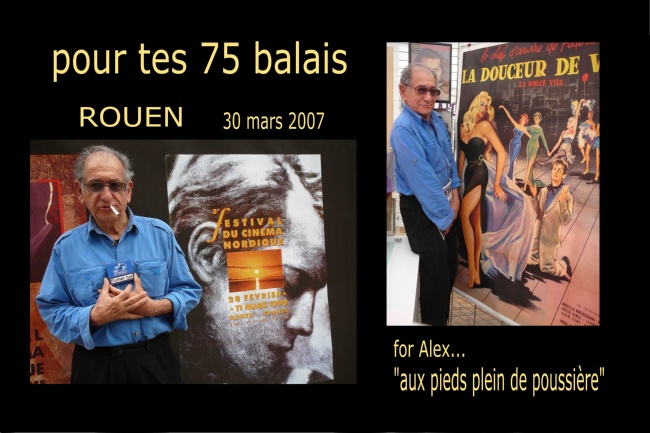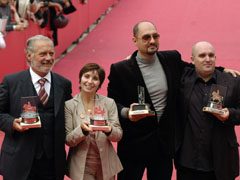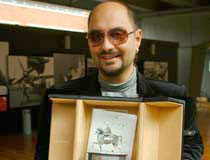|
|
||
|
Pro Tools
FILMFESTIVALS | 24/7 world wide coverageWelcome ! Enjoy the best of both worlds: Film & Festival News, exploring the best of the film festivals community. Launched in 1995, relentlessly connecting films to festivals, documenting and promoting festivals worldwide. Working on an upgrade soon. For collaboration, editorial contributions, or publicity, please send us an email here. User login |
A BRIVELE DER MAMEN ("A little letter to mama")Viewed on video, at J.M's Seattle, Wed. nite, March 7, 2007. This one of the great classics of the pre-war Yiddish cinema and one of the great all time films on the subject of immigration to America. It was the culmination of Joseph Green's amazing four film cycle of Yiddish films made between 1937 (Yidl Mitn Fidl) and 1939, on the brink of WW II. All actors are top stars and character actors of both the Warsaw and New York Yiddish stage, and turn in uniformly superb performances. There are three main roles and numerous excellent supporting roles. The Big Three are "Dobrish" (Lucy Gherman), the mother of the Berdichever family and the central figure of the drama, "Dovid" (Simcha Fostel), her chronically unemployed nebbish of a husband who is devoted to music making and a composer of Yiddish songs, and Shimen the shnaiderl (little tailor) who is a devoted family friend and m'khitn, thru marriage of their respective children, with Dobrish. In other words he has always been an intimate family friend (and drinking plus musical companion of Shimen's) and becomes an in-law (the special "mekhitn' relationship in Jewish culture) when his son finally marries Dobrish's wayward daughter, Mirele. Shimen is played by Max Bozyk, a universal figure in nearly every Yiddish film of the period, and was probably the most popular actor of the Warsaw Yiddish stage because of his ebullient, optimistic personality and his "geshmak" (tasty), fluent Warsaw colloquial speech. When Dovid. a pitiful figure, finally goes off to America to escape the humiliation of being seen as such a loser by everybody except Dobrish in the little home town, it is Max, who empties out the family savings from a jar in the kitchen to pay for his "shiff-karte" -- Passage to the Promised Land of Amerika. Later, when the village is overrun in the war and the Jews have to flee for their lives, it is Shimen ("Simon" the tailor) who bouys up Dobrish's spirits and helps keep them alive, when they finally make it to Warsaw, by taking in patch-work tailoring (he has become a "Latutnik", a patcher, instead of a top notch tailor). The end of the war in 1918 brings joy, but also the tragic news that Dobrish's eldest son was killed at the front, almost at the very end of the war. With her older son dead, her married daughter having gone off to live in Odessa, her husband an unsuccessful runaway to America (even there he's a loser reduced to peddling on the streets in the Jewish quarter) and, worst of all, her little son "Arele" who had such a nice voice as a boy, also having disappeared without a trace once he was sent off to America to spare him the trials of the shtetl -- Dobrish is now a still proud but pathetic figure when tickets come for Shimen the tailor and his wife to go to America. Left without a ticket she will be totally abandoned in Warsaw, and the promised letter from young son Arele has never come. Enter Mr. Shein (Mischa Gherman), the savior from America. This handsome, well-spoken, aristocratic figure of a man is the representative of HIAS (the Jewish Aid to Refugees organization) sent to Poland to assist in getting people out of the post-war ruins and over to America. Shein (in real life the husband of Lucy Gherman and himself a prominent actor of the NY Yiddish stage) now becomes the fourth major figure of the tale. The minute he spots Dobrish milling around in a large waiting room with other prospective refugees he asks a colleague, "Ver iz di froi?" -- Who is that woman? -- clearly, this is the 'coup-de-foudre' --- love at first sight. He then proceeds to give her special attention and secures her passage on the boat back to America as his personal protege and companion. Back in New York the search commences in the immigrant community. Shein has to break the news to Dobrish that her feckless husband, Dovid, has been traced -- but he is already dead. Well, she's now a widow, so the door is open for a deeper relationship -- a romance with Mr. Shein -- but -- what about her long lost little son, Arele, who must now be a grown up man? Of Arele Berditchever no trace. "But we'll find him", Shein assures her. And now the climax. While she is waiting outside Shein's HIAS office in New York, inside a discussion is going on inside, making the final arrangements for a benefit engagement that very night of the new Yiddish-American singing sensation, "Irving Bird" (Could this "Bird", by some stretch of the imagination, be a shortened, Americanized version of an original name "Berd-itchever!! -- You betcha ...) -- to be the guest star at a big HIAS fund-raising concert. Only the most undiscerning viewer would not realize that this tall, handsome, young man is the long-lost Arele, however, when he comes out of the office with his entourage and brushes past Dobrish out in the waiting room, she doesn't recognize him, nor does he ... even notice her. Now comes the climactic concert. Up on the stage "Bird" (Edmund Zayenda) in elegant evening dress commences a series of songs accompanied by an orchestra, conductor and all. In the audience up near the front are seated Dobrish, Shimen the tailor and other "lands-laite" (home town people). When Bird launches into his final song of the night all recognize it as a song written by poor Dovid years ago back in Lubin, Ukraine. As the lights go on in everybody's mind, Dobrish arises from her seat and approaches the stage as if in a trance. As she gets to the few stairs leading up to the podium the song ends to thunderous applause, and Bird is immediately besieged by well-wishers and fans. In the hubbub he again (wow -- second time!) walks right past his mother without recognizing her in the tumultous crowd. Out on the street Dobrish is still in a trance as we see Bird getting into a waiting limousine. She steps off the curb in the direction of the limousine and -- bang -- she is run down by this very car pulling away! Is this her last word in this cruel world? (so that she can at last die happy) -- or, will she make it and live happily ever after with her refound son and go off into the sunset with her handsome Mr. Shein? -- The question is wisely left open ... but personally, I want her to survive, and regret This synopsis of the film may make it sound a bit like a shmaltzy melodrama but, while all the elements of Melo-drama are there, the film "A brivele der Mamen" is far more than the sum of its melodramatic parts, to say the very least. Set pieces are surprisingly --even shockingly -- overturned -- as in the bravura Passover Dinner sequence in which an empty seat is left at the table for father Dovid, who has gone off to America. When the time comes for the Four "Kashes" -- the traditional Four Questions -- "Why is this night different from all other nights of the year" -- Mother Dobrish enjoins young Arele to address the Questions to father's empty seat. The boy begins and duiti\fully recites the first one, but in the middle of the second one he breaks out in tears, screaming at the empty chair "Why did you leave us,Tata!?" --And from there we cut to "Tata" (Dad) in New York selling shoelaces on the street. A powerful moment -- one of many. The famous scene in Warsaw where Shimen the expert tailor, now reduced to patching used clothes and all seems hopeless, pronounces the famous line, "Di velt vert tszefaln azey vi a shlekht geneite hemd" ... "The world is falling apart like a badly sewn shirt." The striking scene where Dobrish, emerging from the charity bread line in Warsaw, having received the last loaf before the bread ran out, spots Hersh-Leib (Samuel Landau) the wholesale fabric dealer from back home in the Ukraine -- a man who at times refused her credit when she was desperate -- and, taking a knife from another woman, cuts the loaf in half and hands half to Landau -- with the deliberately uttered words "Ess gezunterheid" -- Eat it in good health! -- this while the people in her house are on the verge of starvation. Merely describing such scenes are nothing. It's all in the acting and the staging -- the way they are done by director Green and his professional Polish assistant director, Leon Tristan. The cameraman was, by the way, Seweryn Steinwurcel, the leading (Jewish, of course) cameraman of the pre-war Polish film industry. This is in, every way, a polished film up to the best standards of late thirties international filmmaking. The editing is perfect, the camerawork, the incidental music, the performances -- everything is first rate. But, above all this is a film about the processes and psychology of immigration -- not just Jewish immigration -- one which I think would have much to say to any immigrant audience, Korean, Ethiopian, Mexican, Armenian -- any of the ethnic groups which have come to the United States in search of a better life or as refugees from political terror. Other notes. The archival footage portraying the battle fields of World War I are as good or better than any such footage used in films of the time -- or even now! The dream sequence where Dobrish dreams of her son's demise on the battlefield at the moment when he is actually killed, done with skillfull double exposures -- is a forerunner of such scenes in postwar films such as Hitchcock's "Spellbound" -- The chemistry between top star Lucy Gherman and her off-screen husband, Mischa Gherman, is electric. Max Bozyk is an entity unto himself, as Shimen the tailor -- a star character actor if ever there was one. Simche Fostel, who was often paired with Bozyk as a kind of comedy relief team in other films, here gives an exceedingly touching performance as a man so totally dedicated to his love of music that he has no time or energy left over to find a job to support his family -- the original "luftmentsh". His portrait of the pitiful nebbish, despised by everyone in town except for his own wife who always defends him against people insinuating that he's a a good-for-nothing and a hopeless loser as a husband -- and his best friend, Shimen the tailor, who appreciates his talent as a music maker -- is one of the outstanding creations of the Polish-Yiddish cinema. Tenor Edmund Zayenda, on a sheerly musical basis, was a quality singer as good or better than any of the crooners who populated Hollywood films of the late thirties -- and a very handsome presence as well. He can also be seen in another Green film "Mamele" -- starring Molly Picon, which was shot simultaneously with 'Brivele' in early '39. Finally, not enough can be said of Lucy Gherman's towering portrayal of "Dobrish", the heroine of the piece who, with incredible dignity in the face of every kind of adversity and tragedy, toughs it out and shows exactly what it means to be a "survivor" and a compassionate mother as well. Comparisons may be odious, but I would rate her Dobrish right up there with Helen Mirren's recent Queen Elizabeth II, and I don't think I'm going too far out on a limb by saying that. "A Brivele der Mamen" -- (A little letter to Mama ) -- is one of the two or three outstanding works of the Yiddish cinema and a timeless classic in its own right, regardless of language. Alex Deleon, Seattle, March 10, 2007 21.03.2007 | AlexDeleon's blog Cat. : Alex Deleon America Arele Dovid Edmund Zayenda Elizabeth II energy Entertainment Entertainment Helen Mirren HIAS Human Interest Human Interest Joseph Green Leon Tristan Lubin Lucy Gherman Max Bozyk Mirele Mischa Gherman Molly Picon New York NY Yiddish Odessa Poland Samuel Landau Seattle Shein Shimen Simche Fostel Ukraine United States Warsaw Warsaw Yiddish Videos
|
LinksThe Bulletin Board > The Bulletin Board Blog Following News Interview with EFM (Berlin) Director
Interview with IFTA Chairman (AFM)
Interview with Cannes Marche du Film Director
Filmfestivals.com dailies live coverage from > Live from India
Useful links for the indies: > Big files transfer
+ SUBSCRIBE to the weekly Newsletter Deals+ Special offers and discounts from filmfestivals.com Selected fun offers
> Bonus Casino
User imagesAbout AlexDeleon Deleon Alex Deleon Alex (www.filmfestivals.com) THE FESTIVALS BLOG by Alex Deleon. Watch for festival coverage from the circuit. Ambiance and reviews from the hot spots. Welcoming your comments too. View my profile Send me a message The EditorUser contributionsUser links |




























